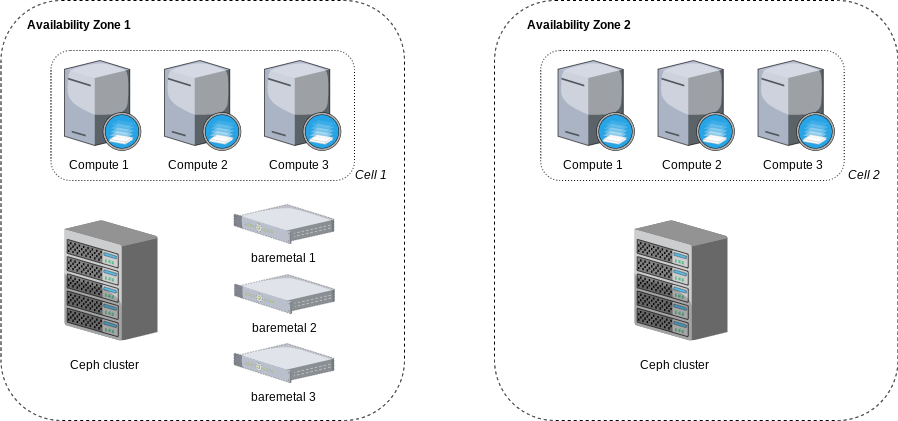« Lab architecture » : différence entre les versions
Sauter à la navigation
Sauter à la recherche
mAucun résumé des modifications |
m (→Resources) |
||
| Ligne 34 : | Ligne 34 : | ||
* 3 VMs acting as hyperconverged nodes in AZ2 on Hypervisor 3 (Supermicro X9SCM-F with Xeon E3-1265L v2, 32 GB RAM ECC DDR3) | * 3 VMs acting as hyperconverged nodes in AZ2 on Hypervisor 3 (Supermicro X9SCM-F with Xeon E3-1265L v2, 32 GB RAM ECC DDR3) | ||
The bare metal nodes are "simulated" thanks to [https://github.com/openstack/virtualbmc Virtual BMC]. Ironic indeed | The bare metal nodes are "simulated" thanks to [https://github.com/openstack/virtualbmc Virtual BMC]. Ironic uses indeed the IPMI protocol to turn on/off/change the boot order of nodes. | ||
Version du 21 décembre 2022 à 11:12
One region, two availability zones
This Openstack Lab is composed of one region (fr1) and two availability zones (az1 and az2).
In the first availability zone :
In the second availability zone :
- 3 compute nodes
- 1 Ceph cluster
Networks
The different networks are :
- fr1-az1 : provider network in AZ1 (flat, i.e. without VLAN, shared, i.e. available for everybody and external, i.e. managed outside Openstack)
- fr1-az2 : provider network in AZ2
- ironic : external VLAN for bare metal nodes (only available in AZ1)
- octavia : external VLAN for Octavia management (only available in AZ1)
Resources
For the needs of the lab, the actual hardware used is :
- 4 VMs for Openstack controllers on a workstation
- 3 VMs acting as hyperconverged nodes in AZ1 on Hypervisor 1 (Supermicro X10SL7-F with Xeon E3-1265L v3, 32 GB RAM ECC DDR3)
- 3 VMs acting as bare metal nodes in AZ1 on Hypervisor 2 (HP Elitedesk 800 g2 mini with Core i5-6500t, 32 GB RAM DDR4)
- 3 VMs acting as hyperconverged nodes in AZ2 on Hypervisor 3 (Supermicro X9SCM-F with Xeon E3-1265L v2, 32 GB RAM ECC DDR3)
The bare metal nodes are "simulated" thanks to Virtual BMC. Ironic uses indeed the IPMI protocol to turn on/off/change the boot order of nodes.


